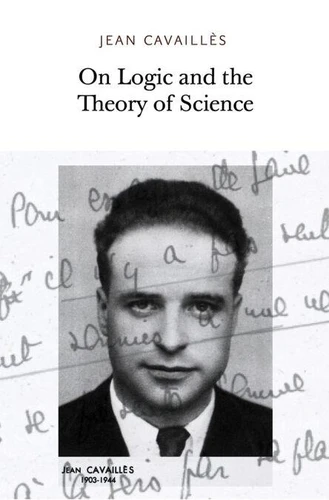On Logic and the Theory of Science
Par :Formats :
Disponible dans votre compte client Decitre ou Furet du Nord dès validation de votre commande. Le format ePub protégé est :
- Compatible avec une lecture sur My Vivlio (smartphone, tablette, ordinateur)
- Compatible avec une lecture sur liseuses Vivlio
- Pour les liseuses autres que Vivlio, vous devez utiliser le logiciel Adobe Digital Edition. Non compatible avec la lecture sur les liseuses Kindle, Remarkable et Sony
- Non compatible avec un achat hors France métropolitaine
 , qui est-ce ?
, qui est-ce ?Notre partenaire de plateforme de lecture numérique où vous retrouverez l'ensemble de vos ebooks gratuitement
Pour en savoir plus sur nos ebooks, consultez notre aide en ligne ici
- Nombre de pages144
- FormatePub
- ISBN978-1-913029-41-8
- EAN9781913029418
- Date de parution27/04/2021
- Protection num.Adobe DRM
- Taille1 Mo
- Infos supplémentairesepub
- ÉditeurUrbanomic/Sequence Press
Résumé
A new translation of the final work of French philosopher Jean Cavaillès. In this short, dense essay, Jean Cavaillès evaluates philosophical efforts to determine the origin-logical or ontological-of scientific thought, arguing that, rather than seeking to found science in original intentional acts, a priori meanings, or foundational logical relations, any adequate theory must involve a history of the concept.
Cavaillès insists on a historical epistemology that is conceptual rather than phenomenological, and a logic that is dialectical rather than transcendental. His famous call (cited by Foucault) to abandon "a philosophy of consciousness" for "a philosophy of the concept" was crucial in displacing the focus of philosophical enquiry from aprioristic foundations toward structural historical shifts in the conceptual fabric.
This new translation of Cavaillès's final work, written in 1942 during his imprisonment for Resistance activities, presents an opportunity to reencounter an original and lucid thinker. Cavaillès's subtle adjudication between positivistic claims that science has no need of philosophy, and philosophers' obstinate disregard for actual scientific events, speaks to a dilemma that remains pertinent for us today.
His affirmation of the authority of scientific thinking combined with his commitment to conceptual creation yields a radical defense of the freedom of thought and the possibility of the new.
Cavaillès insists on a historical epistemology that is conceptual rather than phenomenological, and a logic that is dialectical rather than transcendental. His famous call (cited by Foucault) to abandon "a philosophy of consciousness" for "a philosophy of the concept" was crucial in displacing the focus of philosophical enquiry from aprioristic foundations toward structural historical shifts in the conceptual fabric.
This new translation of Cavaillès's final work, written in 1942 during his imprisonment for Resistance activities, presents an opportunity to reencounter an original and lucid thinker. Cavaillès's subtle adjudication between positivistic claims that science has no need of philosophy, and philosophers' obstinate disregard for actual scientific events, speaks to a dilemma that remains pertinent for us today.
His affirmation of the authority of scientific thinking combined with his commitment to conceptual creation yields a radical defense of the freedom of thought and the possibility of the new.
A new translation of the final work of French philosopher Jean Cavaillès. In this short, dense essay, Jean Cavaillès evaluates philosophical efforts to determine the origin-logical or ontological-of scientific thought, arguing that, rather than seeking to found science in original intentional acts, a priori meanings, or foundational logical relations, any adequate theory must involve a history of the concept.
Cavaillès insists on a historical epistemology that is conceptual rather than phenomenological, and a logic that is dialectical rather than transcendental. His famous call (cited by Foucault) to abandon "a philosophy of consciousness" for "a philosophy of the concept" was crucial in displacing the focus of philosophical enquiry from aprioristic foundations toward structural historical shifts in the conceptual fabric.
This new translation of Cavaillès's final work, written in 1942 during his imprisonment for Resistance activities, presents an opportunity to reencounter an original and lucid thinker. Cavaillès's subtle adjudication between positivistic claims that science has no need of philosophy, and philosophers' obstinate disregard for actual scientific events, speaks to a dilemma that remains pertinent for us today.
His affirmation of the authority of scientific thinking combined with his commitment to conceptual creation yields a radical defense of the freedom of thought and the possibility of the new.
Cavaillès insists on a historical epistemology that is conceptual rather than phenomenological, and a logic that is dialectical rather than transcendental. His famous call (cited by Foucault) to abandon "a philosophy of consciousness" for "a philosophy of the concept" was crucial in displacing the focus of philosophical enquiry from aprioristic foundations toward structural historical shifts in the conceptual fabric.
This new translation of Cavaillès's final work, written in 1942 during his imprisonment for Resistance activities, presents an opportunity to reencounter an original and lucid thinker. Cavaillès's subtle adjudication between positivistic claims that science has no need of philosophy, and philosophers' obstinate disregard for actual scientific events, speaks to a dilemma that remains pertinent for us today.
His affirmation of the authority of scientific thinking combined with his commitment to conceptual creation yields a radical defense of the freedom of thought and the possibility of the new.









